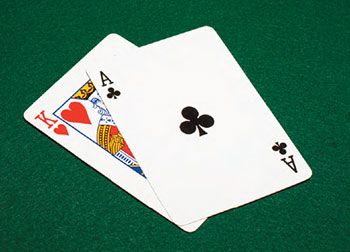Food For Thought
Gaming ingredients for smart blackjack play
By Frank Scoblete
 Take any food package or jar of food and you will invariably see on the back or side of it a list of the ingredients that food contains. This is obviously an attempt to help you decide whether to eat that particular food. I check out the calories first. Has that helped me? I refuse to answer on the grounds that it might incriminate me.
Take any food package or jar of food and you will invariably see on the back or side of it a list of the ingredients that food contains. This is obviously an attempt to help you decide whether to eat that particular food. I check out the calories first. Has that helped me? I refuse to answer on the grounds that it might incriminate me.
I think we should have the same thing for casino games. Why shouldn’t players know what they are getting into? Too many play the games and are not aware of exactly what they are doing. The more you know (hopefully) the less you will lose over time.
The key to casino play is to try to keep your losses as small as possible. All casino gamblers know—or should know—that the house has an edge on every game and just about every bet at every game. If they don’t know this, then, well, they better learn it as fast as possible as such learning can be considered an exercise in self-preservation.
So here is my first gaming ingredients column. We’ll tackle the most popular table game, blackjack, to see what exactly is in that concoction.
Since the mid-1960s blackjack has taken the crown away from craps as the favored game. This has to do with two things: the arrival of the card-counting revolution and the arrival of more and more female players. Craps was and still is a male-dominated game. Sadly, few females flock to it.
THE BLACKJACK FACTS
Hands per hour: Between 60 and over 100
Proper playing method: Computer-derived basic strategy. House edges: Depending on game, about one-half percent. Money equivalent: An expected loss of 50 cents per $100 wagered over time.
Improper playing strategies: Based on your own logic or the advice of people who have no idea of what they are doing, seriously wrong methods predominate in some quarters of the blackjack community.
House edges: 2 percent or more.
Money equivalent: A loss of $2 or more per $100 wagered over time.
Do not: Play more than one hand as this increases the money the house edge will grind away at.
Do not: Increase bets in hot streaks as the house wins approximately 48 percent of the hands while the player wins approximately 44 per- cent and approximately 8 percent are pushes; therefore, you are again giving the house edge more money to grind away at.
Table selection: Only play at full or close to full tables as this reduces the total number of decisions the house edge can attack.
Number of players: In general, the more players the fewer the hands an individual player will bet; fewer players will mean the more hands on which the player will wager.
Bathroom breaks: Only when the game is in full swing, not during a shuffle, as going to the bathroom in this way reduces the total number of hands a player plays and over time that will mean fewer losses.
Good streaks: Can be short and strong for the player who makes the proper decisions based on basic strategy.
Bad streaks: On premium hands where the player doubles down, splits pairs, doubles after splits, although these will help the player over- all and should be played correctly, a losing streak on those hands can put the player in a deep hole that will be difficult to escape.
No perfection: No hand in blackjack, even a blackjack itself, is a perfect hand as blackjacks can tie with the dealer’s blackjack
EXTRA NOTES
Avoid: Blackjack games where the payout for a blackjack is 6 to 5 as the house edge might more than double in such games.
Rules count: The more liberal the rules at the game, the better it is for the player; the more restrictive the rules, the better it is for the casino.
Giving advice: Even if a player asks you for advice, politely tell that player to ask the dealer. Even seemingly nice players might get angry if your advice fails them; best to remain silent.
COMPS
Almost all casino players who hand in a player’s card will get some kind of comps.
- comps are not judgements of your character.
- they are judgements based on what the house considers how much on average you will lose playing your way at your level of stakes over time.
- the house wants to establish your theoretical loss and they will comp you based on that.
- comps are not free stuff, they are based on your potential losses.
- your casino rating is based on the “quality” of your potential losses.
I am guessing many of you can add to this ingredients list. Do so. As stated, the key to casino gaming is being able to keep your losses as low as possible.
Enjoy your wins, too, and these will come more frequently if you play correctly. Maybe that goes without saying but I said it anyway.
All the best in and out of the casinos!
Frank Scoblete’s website is www.frankscoblete.com. His books are available at Amazon.com, Barnes and Noble, Kindle, e-books, libraries and bookstores.


